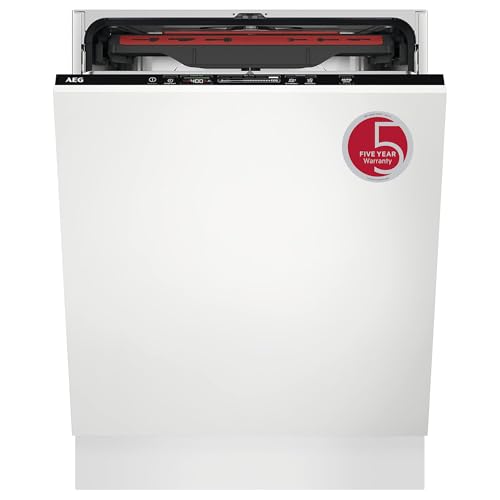




Granite worktops are a popular choice for kitchens and bathrooms due to their durability and beautiful appearance. However, keeping them clean and looking their best can sometimes be a challenge. To help you maintain the elegance and longevity of your granite worktops, we have compiled a list of easy and effective cleaning tips.
1. Clean Spills Immediately: It is important to clean up any spills on your granite worktops immediately to prevent staining. Use a paper towel or a soft cloth to blot the spill, rather than wiping it, as wiping can spread the liquid and potentially stain a larger area.
2. Use a Mild Cleaning Solution: Harsh chemicals can damage the sealant on your granite worktops, so it is best to use a mild cleaning solution. Mix warm water with a few drops of dish soap and gently wipe down the surface with a soft cloth or sponge. Avoid using abrasive cleansers or scrub brushes.
3. Avoid Acidic Cleaners: Acidic cleaners, such as vinegar or lemon juice, can cause etching on granite surfaces. Avoid using these cleaners or any products that contain acid to prevent potential damage.
4. Use a Granite-Safe Cleaner: To enhance the cleanliness and shine of your granite worktops, consider using a granite-specific cleaner. These cleaners are specifically formulated to clean and protect the natural stone without damaging the surface or the sealant.
5. Regularly Seal your Granite: Granite worktops should be sealed every 1-2 years to maintain their stain resistance and shine. It is best to consult with a professional or follow the manufacturer’s instructions for sealing your specific type of granite.
By following these easy and effective tips, you can keep your granite worktops clean, beautiful, and in excellent condition for years to come.
Why Clean Granite Worktops?
Granite worktops are a popular choice for kitchens and bathrooms due to their durability, aesthetic appeal, and resistance to heat and stains. However, it is important to regularly clean and maintain granite worktops to keep them looking their best and to prevent damage.
Here are a few reasons why it is important to clean granite worktops:
- Maintain Appearance: Regular cleaning helps to remove dirt, grime, and stains from the surface of the granite worktop, ensuring that it stays looking clean and fresh. This is particularly important for lighter granite surfaces, which can show stains and spills more easily.
- Prevent Staining: Granite worktops are not completely immune to stains. Certain substances, such as acidic juices, wine, and oil, can stain the surface if left untreated for a long time. Regular cleaning and sealing can help protect the granite from absorbing these substances and minimize the risk of staining.
- Prevent Bacterial Growth: Bacteria and germs can accumulate on the surface of granite worktops, especially in areas where food is prepared. Routine cleaning with a mild soap or granite cleaner helps to remove these contaminants, promoting a hygienic environment in the kitchen.
- Preserve Durability: Proper cleaning and maintenance can help extend the lifespan of granite worktops. Harsh chemicals and abrasive cleaning tools should be avoided as they can damage the surface and weaken its protective seal. Using gentle cleansers and soft cloths or sponges will help keep the granite in good condition.
By regularly cleaning and caring for your granite worktops, you can ensure that they remain a beautiful and functional addition to your kitchen or bathroom for years to come.
The Benefits of Having Clean Granite Worktops
1. Enhanced Aesthetics
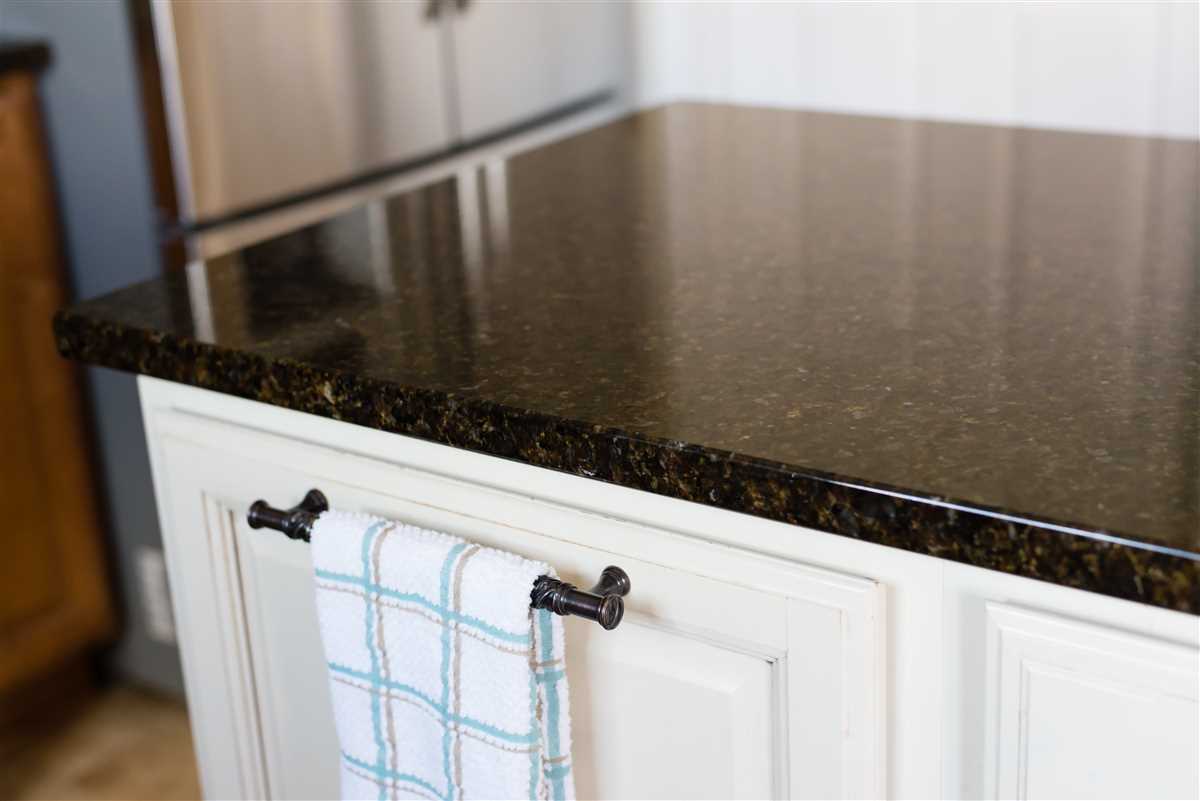
Having clean granite worktops can greatly enhance the overall aesthetics of your kitchen or bathroom. Granite is a natural stone that comes in a variety of rich and vibrant colors, and when it is clean and well-maintained, it exudes a luxurious and elegant look. Clean granite worktops can instantly elevate the visual appeal of your space, making it more inviting and appealing to guests.
2. Increased Durability
Cleaning granite worktops regularly helps to maintain their durability. Granite is a resilient material that can withstand the daily wear and tear of kitchen or bathroom use. However, if it is not properly cleaned and maintained, dirt, grime, and spills can accumulate, causing the surface to become dull and susceptible to damage. By keeping your granite worktops clean, you are ensuring their longevity and durability.
3. Improved Hygiene
Proper cleaning of granite worktops helps to maintain good hygiene in your kitchen or bathroom. Granite is a non-porous material, which means it is resistant to bacteria and germs. However, if left dirty, it can become a breeding ground for harmful microorganisms. Regular cleaning and disinfecting of granite worktops can help to prevent the spread of bacteria and maintain a healthy and hygienic environment.
4. Ease of Maintenance
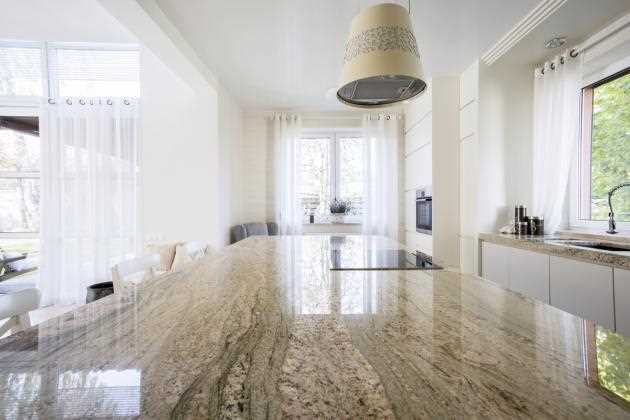
Keeping granite worktops clean is relatively easy and requires minimal effort. Regular wiping with a mild detergent or specialized granite cleaner is usually sufficient to remove dirt and stains. Unlike other materials, granite does not require extensive maintenance or frequent sealing. By simply incorporating regular cleaning into your routine, you can keep your granite worktops looking pristine for years to come.
5. Protection of Investment
Granite worktops are an investment in your home. They add value to your property and can fetch a higher price if you ever decide to sell. By keeping your granite worktops clean and well-maintained, you are protecting your investment. Clean worktops help to preserve the beauty and integrity of the granite, ensuring that it retains its value over time.
Conclusion
Clean granite worktops offer a range of benefits that go beyond just aesthetics. They enhance the overall look of your space, increase the durability of the granite, improve hygiene, are easy to maintain, and protect your investment. By incorporating regular cleaning into your routine, you can enjoy the many advantages of having clean granite worktops for years to come.
Tips for Maintaining Clean Granite Worktops
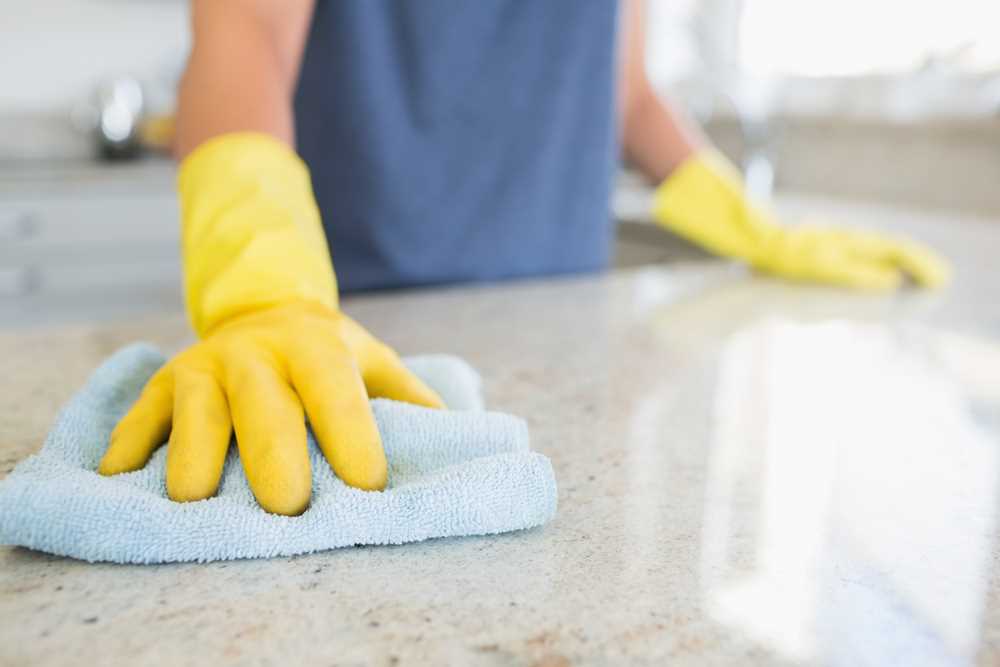
1. Wipe up spills immediately
Granite worktops are porous, meaning that they can absorb liquids and stains. To prevent stains from setting in, it is important to wipe up spills immediately. Use a soft cloth or paper towel to blot the spill, rather than wiping it across the surface.
2. Use a pH-neutral cleaner
When cleaning your granite worktops, be sure to use a pH-neutral cleaner. Avoid using harsh or abrasive cleaners, as they can damage the surface of the granite. Instead, opt for a mild detergent or a cleaner specifically designed for granite surfaces. Dilute the cleaner in water according to the manufacturer’s instructions, then use a soft cloth or sponge to clean the worktops.
3. Avoid using acidic or abrasive substances
Acidic substances such as vinegar, lemon juice, or ammonia can etch the surface of the granite and cause damage. Similarly, abrasive substances like steel wool or rough sponges can scratch the surface. Avoid using these substances when cleaning your granite worktops.
4. Clean regularly
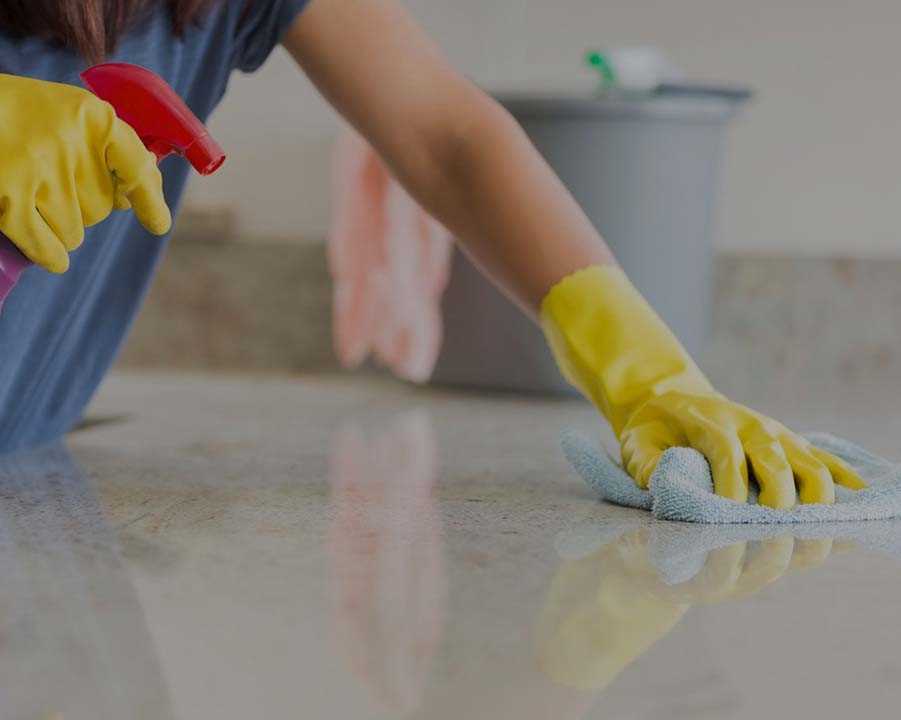
To keep your granite worktops looking their best, it is important to clean them regularly. Wipe down the surface with a damp cloth or sponge on a daily basis to remove any dirt or debris. This will help prevent the build-up of grime and make it easier to maintain the appearance of the worktops.
5. Use coasters and cutting boards
To protect your granite worktops from scratches and heat damage, it is recommended to use coasters and cutting boards. Place coasters under glasses and hot pans to prevent direct contact with the granite. Use cutting boards when chopping or slicing to avoid scratching the surface.
6. Avoid placing hot objects directly on the worktops
Granite worktops can withstand high temperatures, but it is still best to avoid placing hot objects directly on the surface. Use trivets or hot pads to protect the worktops from heat damage caused by hot pans or dishes.
7. Seal the granite regularly
Granite worktops should be sealed to protect them from stains and damage. Depending on the type of granite and level of use, it is recommended to seal the worktops every 6 to 12 months. Follow the manufacturer’s instructions for the specific sealant you are using.
8. Avoid dragging heavy objects
When moving heavy objects, avoid dragging them across the granite worktops. This can cause scratches or damage to the surface. Instead, lift and carefully place the objects to prevent any harm to the worktops.
9. Be mindful of sharp objects
Granite is a durable material, but it can still be prone to scratching. Be mindful of sharp objects, such as knives or metal utensils, and avoid dragging or scraping them across the surface of the worktops. Use cutting boards or other protective surfaces when necessary.
10. Regularly inspect the worktops
Periodically, inspect your granite worktops to check for any signs of damage or wear. Look for any cracks, chips, or stains that may require professional repair or maintenance. By catching any issues early, you can prevent further damage and keep your worktops looking their best.
By following these tips for maintaining clean granite worktops, you can keep your kitchen surfaces looking beautiful and ensure their longevity.
Safe and Effective Cleaning Products for Granite Worktops
When it comes to cleaning your granite worktops, it’s important to choose the right products that are safe for use on this particular surface. Using the wrong cleaners can damage the granite and cause it to lose its shine. Here are some safe and effective cleaning products that you can use to maintain the beauty of your granite worktops:
1. Mild Dish Soap
One of the simplest and most effective cleaning solutions for granite worktops is a mixture of mild dish soap and warm water. This gentle combination can effectively remove dirt, food stains, and other residues without causing any harm to the granite surface.
2. Isopropyl Alcohol
If you’re dealing with tougher stains or grease buildup, you can use isopropyl alcohol to tackle the problem. Mix equal parts of isopropyl alcohol and water, then apply the solution to the stained area and gently scrub with a soft cloth or sponge. Rinse thoroughly afterward to remove any residue.
3. Baking Soda
Baking soda is a natural and safe cleaning agent that can be used to remove stubborn stains on granite worktops. Make a paste by mixing baking soda with water, then apply it to the stained area. Let it sit for a few minutes before scrubbing gently with a soft cloth. Rinse thoroughly afterward.
4. Granite-Specific Cleaners
There are also commercially available granite-specific cleaners that are formulated to effectively clean and maintain granite surfaces. These cleaners are often pH-neutral, which means they won’t harm the granite or strip away its natural shine. Follow the instructions on the product label for best results.
5. Avoid Harsh Chemicals
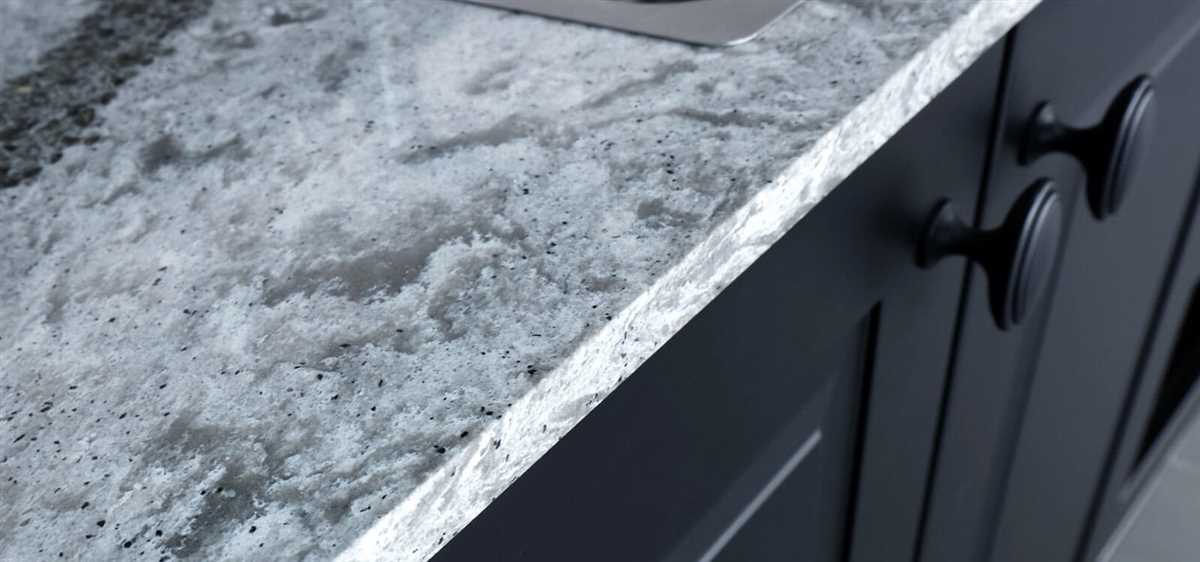
When cleaning granite worktops, it’s important to avoid using harsh chemicals such as bleach, ammonia, or abrasive cleaners. These products can cause damage to the granite and wear away its protective sealant. Stick to the safe and gentle options mentioned above to ensure the longevity and beauty of your granite worktops.
Remember to always test any cleaning product on a small, inconspicuous area of your granite worktop before using it on the entire surface. This will help you ensure that the product doesn’t cause any unwanted effects or discoloration.
Preventing Stains and Damage to Granite Worktops
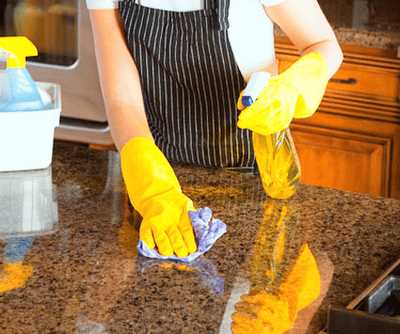
1. Clean up spills immediately
Granite worktops are very porous, which means they can easily absorb liquids and stains. To prevent stains, it is important to clean up spills as soon as they happen. Use a soft cloth and a non-abrasive cleaner to gently wipe away the spill. Avoid using acidic or abrasive cleaners, as they can damage the surface of the granite.
2. Use coasters and placemats
To protect your granite worktops from heat damage and potential stains from glasses and dishes, always use coasters and placemats. This will create a barrier between the hot or moist object and the surface of the granite, preventing any potential damage or staining.
3. Avoid using harsh chemicals
When cleaning your granite worktops, it is best to avoid using harsh chemicals such as bleach or ammonia. These chemicals can strip away the sealant on the granite, leaving it vulnerable to stains and damage. Instead, opt for mild, pH-neutral cleaners specifically formulated for granite surfaces.
4. Seal the granite regularly
Granite worktops should be sealed regularly to maintain their appearance and protect them from stains. The frequency of sealing depends on the specific type of granite and its usage. Generally, it is recommended to seal granite worktops at least once a year. However, high-traffic areas may require more frequent sealing. Consult with a professional or refer to the manufacturer’s guidelines for the appropriate sealant and sealing schedule.
5. Avoid using sharp objects directly on the surface
Granite worktops are highly durable, but they can be scratched or chipped by sharp objects. To prevent any damage, always use cutting boards or chopping blocks when working with knives or other sharp utensils. Avoid sliding heavy or rough items across the surface, as this can also cause scratching.
6. Use trivets for hot objects
Direct exposure to hot objects can cause thermal shock and potentially crack the granite worktops. To protect them from heat damage, always use trivets or hot pads when placing hot pans, pots, or other hot objects on the surface. This will help distribute the heat and prevent any potential damage.
- Clean up spills immediately
- Use coasters and placemats
- Avoid using harsh chemicals
- Seal the granite regularly
- Avoid using sharp objects directly on the surface
- Use trivets for hot objects
FAQ
What is the best way to clean granite worktops?
The best way to clean granite worktops is to use a mixture of warm water and a mild dish soap. You can also use a pH-neutral granite cleaner for tougher stains. Avoid using harsh chemicals or abrasive cleaners as they can damage the surface of the granite.
Can I use vinegar to clean granite worktops?
No, you should not use vinegar to clean granite worktops. Vinegar is acidic and can etch the surface of the granite. It can also strip away the sealant on the granite, making it more susceptible to stains and damage.
How often should I clean my granite worktops?
It is recommended to clean and wipe your granite worktops daily to remove any spills or residues. This will help prevent stains and keep the surface looking clean and polished. Additionally, you should reseal your granite worktops every 1-3 years to maintain their durability and shine.
What should I do if there is a stain on my granite worktops?
If there is a stain on your granite worktops, you can try creating a paste using baking soda and water. Apply the paste to the stain, cover it with plastic wrap, and let it sit overnight. Then, wipe away the paste and rinse the area with water. For tough stains, you may need to use a granite cleaner or contact a professional.
Is it safe to place hot pans or pots directly on granite worktops?
No, it is not recommended to place hot pans or pots directly on granite worktops. The heat can cause the granite to expand and potentially crack. It is best to use trivets or heat-resistant pads to protect the surface of the granite.






